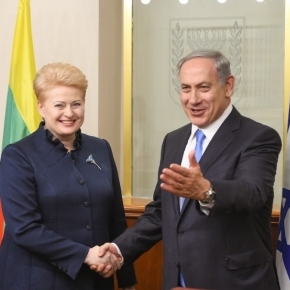
Community

Jewish/Lithuania relations – fleeting or permanent
MICHAEL KRANSDORFF
For almost 20 years, Litvaksig, a Lithuanian Jewish heritage organisation, through the translation of almost two million Lithuanian archival records (which include information such as census data, tax records, and births) stretching from as far back as 1795 to 1940, has been bringing this history to light.
While initially documents useful for family research (especially for South African Jews, the vast majority of whose ancestors were Lithuanian) were prioritised, recently files of more general Jewish historical significance have been found in the Lithuanian archives.
One such document is a list of Lithuanian Jews who volunteered to serve in the fledgling Lithuanian army during its wars of independence from 1918 to 1920.
This finding brings to light, in very personal detail, the largely forgotten and, in the context of subsequent political events, the almost unimaginable golden age of Lithuanian/Jewish co-existence.
In the dying days of the First World War and with the collapse of the Russian Empire, Lithuania along with many other smaller Eastern European nations declared independence. It was a bloody affair as Polish, Belarusian and Soviet forces (with competing territorial claims) all launched their own wars against the new state. This dire situation led to a confluence of interests for Jews and ethnic Lithuanian.
The first Lithuanian government adopted an unprecedentedly progressive policy towards its ethnic minorities (especially the sizable Jewish community, which made up eight per cent of the total population).
A special Ministry of Jewish Affairs was established; Jews were given two additional Cabinet posts (deputy foreign minister and deputy minister of commerce) and proportional representation in the new parliament.
Moreover, at a local level, wide-ranging autonomy in the administration of cultural, religious, and social affairs was granted— to such an extent that Jewish communities had the right to collect their own taxes to finance Jewish institutions.
In response, Jews played a significant role in fighting to secure these political freedoms. Over 500 young Jewish men from numerous towns and villages across Lithuania volunteered to take up arms against the invading armies, with nine becoming officers.
As J Šapiro, a Jewish soldier from Joniškis, later wrote about this remarkable historical moment: “The joint fate of Jews and Lithuanians, having dragged the same czarist yoke for centuries, awakened in us Lithuania’s Jews, a consciousness of the same fate for our peoples, and a resolve to win, together, an independent nation.”
Twenty three Jewish soldiers were awarded Lithuania’s highest medal (the Vytis Cross) for bravery and 73 Jews paid the ultimate price (a memorial plaque to them still hangs in the Kaunas Choral Synagogue).
Unfortunately, this democratic honeymoon was short lived. Once Lithuanian independence was firmly established and geopolitical interests shifted, Jewish rights were quickly eroded and the political discourse became increasingly ethno-nationalist, culminating in a rightwing coup in 1926.
This prompted a wave of Jewish emigration, with the greatest share (35 per cent) choosing to make South Africa their new home. The vast majority of those who remained were murdered in the Holocaust.
Despite this turbulent history, circumstances today are once again facilitating Jewish/Lithuanian co-operation. This was highlighted by Lithuanian President Dalia Grybauskaitė’s visit to Israel last month, accompanied by Faina Kukliansky (chairwoman of the Lithuanian Jewish community).
Security co-operation was high on the agenda with both nations seeing themselves as small Western outposts in increasingly dangerous neighbourhoods. Economics ties are also a key component of this renewed association, with Lithuania hoping to attract Jewish investment and technology to augment its fast growing economy and Israeli firms looking to gain access to European markets.
The Lithuanian head of state visited Yad Vashem to commemorate Holocaust victims and planted an olive tree in the Garden of the Righteous among Nations.
Is this just another fleeting Jewish/Lithuanian relationship based on the alignment of short-term interests, as happened in the early 1920s, or is it the beginning of a more permanent alliance? The level of commitment to confronting the past, dedication to democratic values and the extent of mutually beneficial economic partnerships, will be key.
- Michael Kransdorff is a macroeconomic strategist and the Litvaksig research co-ordinator for the Zarasai region.




